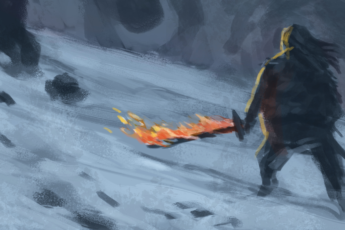
Hex
1 enchantment
- Casting Time: 1 bonus action
- Range: 90 feet
- Components: V S M (A petrified eye of a newt)
- Duration: Concentration, Up to 1 hour
- Classes: Warlock
You place a curse on a creature that you can see within range. Until the spell ends, you deal an extra 1d6 necrotic damage to the target whenever you hit it with an attack. Also, choose one ability when you cast the spell. The target has disadvantage on ability checks made with the chosen ability.
If the target drops to 0 hit points before this spell ends, you can use a bonus action on a subsequent turn of yours to curse a new creature.
A remove curse cast on the target ends this spell early.
At Higher Levels. When you cast this spell using a spell slot of 3rd or 4th level, you can maintain your concentration on the spell for up to 8 hours. When you use a spell slot of 5th level or higher, you can maintain your concentration on the spell for up to 24 hours.
Our Thoughts
Hex is an excellent spell that allows you to deal more damage (1D6 necrotic) with your physical attack and Eldritch Blast. This is extremely useful for the Warlock class.
However, being a warlock is not the only way to gain Hex. If you are willing to give up your ability score increase for a feat, or if you are a variant human, you can take Magic Initiate. This feat will grant you access to the warlock spell list. Take Hex as your first-level spell, and you are all set to do that extra damage.
Another way to use hex to your advantage would be to work with your party to determine which ability score to affect with the spell, causing disadvantage. For example, if you have a wizard who just learned fireball, you can help them out by making the targeted enemy take disadvantage to dexterity checks, increasing the chance of the spell taking full effect.

FAQ’s About Hex
Does Hex give disadvantage on attacks?
No, it does not grant disadvantage on attacks. Hex only grants disadvantage on ability checks. Only one ability check can be hexed at a time. For example, if you Hex an opponent’s strength and they are grappled afterward, they will have to perform their strength check with disadvantage. However, if they must perform a dexterity check to avoid a trap, they perform that normally, as only their strength is affected.
Does hex work on saves?
No, Hex does not work on saving throws, only ability checks. So, for example, if you Hex an opponent’s dexterity and in the next round they must make a dexterity saving throw against a spell like Burning Hands, they do so normally with no disadvantage because it is a saving throw, not an ability check.
Does hex affect spellcasting?
Yes, hex will affect some spellcasting. For example, any spell that requires an attack roll to hit like Eldritch Blast will gain the extra 1D6 damage if it hits from Hex.
Does hex last between combats?
When cast at 1st level, the Hex spell will last up to 1 hour.
At 3rd or 4th level, you can maintain your concentration on the spell for up to 8 hours.
And at 5th level or higher, you can maintain your concentration on the spell for up to 24 hours.
Does Hex work with Magic Missile?
No, Magic Missile does not require an attack roll therefore, it does not qualify as an attack.
Page 193 of the Players Handbook states:
Making an Attack
Whenever you’re striking with a melee weapon, firing a weapon at range, or making an attack roll as part of the spell, an attack has a simple structure.
And on page 194, it states:
If there’s ever any question about whether something you’re doing counts as an attack, the rule is simple: if you’re making an attack roll, you’re making an attack.
Does Hex stack with Eldritch Blast?
Yes, Hex will stack with Eldritch Blast. Because you make an attack roll to hit, it counts as an attack.
Page 193 of the Players Handbook states:
Making an Attack
Whenever you’re striking with a melee weapon, firing a weapon at range, or making an attack roll as part of the spell, an attack has a simple structure.
And on page 194, it states:
If there’s ever any question about whether something you’re doing counts as an attack, the rule is simple: if you’re making an attack roll, you’re making an attack.





Leave a Comment